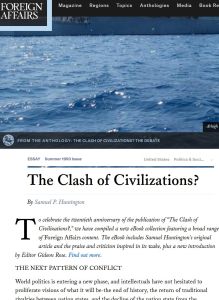Join getAbstract to access the summary!

Join getAbstract to access the summary!
Samuel P. Huntington
Clash of Civilizations?
The Next Pattern of Conflict
Foreign Affairs, 1993
What's inside?
A “clash of civilizations” will be the central feature of future global politics.
Recommendation
Political scientist Samuel P. Huntington’s controversial 1993 essay “The Clash of Civilizations?” claimed that conflicts among civilizations would define post–Cold War global politics. Decades later, scholars continue to debate the merits of Huntington’s argument. While some credit him with correctly predicting the cultural and religious context of transnational Islamic terrorism, others point out that more traditional interstate rivalries and geopolitics continue to dominate international relations. Huntington’s thesis, however, remains a useful theoretical framework within which to study conflict in a globalized world.
Summary
About the Author
Samuel P. Huntington (1927–2008) was a political scientist and professor at Harvard University.

















Comment on this summary